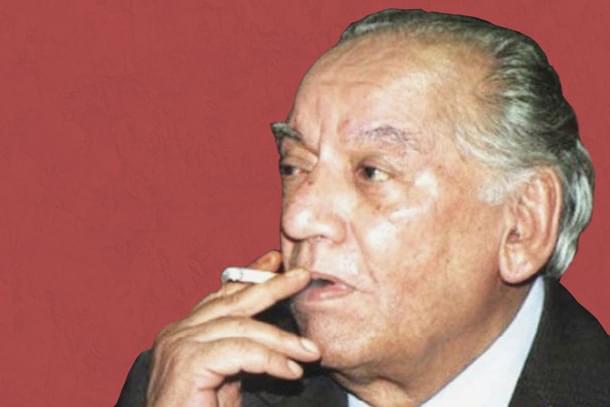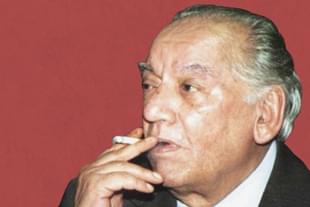Politics
‘Hum Dekhenge’ To ‘Chalo Dekhein’: Let Us See If Faiz Was A Marxist Or Islamist
Vikas Saraswat
Dec 27, 2019, 02:24 PM | Updated 05:15 PM IST
Save & read from anywhere!
Bookmark stories for easy access on any device or the Swarajya app.


The frightening violence throughout the country which marked the protests over Citizenship Amendment Act (CAA) was marred by provocative Islamic slogans. Slogans like “Hinduon se azaadi” (freedom from Hindus) and “kaafiron se azaadi”(freedom from non-believers) were raised.
A poster depicting Om with the four-letter cuss word was also seen. In Patna, a Hanuman temple was vandalised by a crowd of Muslim protesters.
The communal nature of CAA and National Register of Citizens (NRC) protests had become so pronounced that Kerala Lawyers Forum, an affiliate body of Indian Union Muslim League, decided to undertake training and awareness programmes for Muslims to keep the religious element away from the protests.
Like many other campuses in India, at Indian Institute of Technology-Kanpur, a protest was held as a mark of solidarity with the student ‘victims’ of lathicharge at Jamia Millia University. In this protest, an Urdu nazm "Hum Dekhenge" by poet Faiz Ahmed Faiz was sung by the protesters.
Certain words with an iconoclastic imagery from the poem caused alarm and consternation in public. Many responded with shock at the words. As is their wont, Indian liberals, who wouldn't tolerate anything against Islamic symbols including Urdu, were out in the open to defend the poem vehemently.
For Left liberals who would find innocence of youth in the stone-pelters of Kashmir and trust in Afzal Guru over the country's apex court, questioning Faiz was a secrilege. Faiz, after all was an icon of progressivism; writing in Urdu — the language of beau monde, our cultured class. How could someone find anything objectionable about his writing! They accused the objecting Hindus of being illiterate bigots.
The contempt with which a Bollywood actress was chiding people on twitter for not knowing Faiz reminded me of a comic scene from a short film where the estranged lady was shouting at her lover "maine tumhein Kafka padhna sikhaya" (I taught you to read Kafka).
For common people, however, there are many a worry bigger than Kafka or Faiz, more so when the two are foreigners to them. But it isn't as if some of us haven't read Faiz or heard his nazm in question.
Regarded by many as the greatest poet of Pakistan, Faiz Ahmed Faiz donned many a hat in his lifetime. Editor, educationist and trade unionist, Faiz also held a few important positions in the government of Pakistan.
Among the many awards and accolades showered on him, he was also conferred with Lenin Peace Prize. Although he had received some education in Islamic studies, he was a Marxist by conviction.
A poet par excellence, Faiz combined contemporary idiom with classical Urdu to create, undoubtedly, some of the best modern poetry in the language. While a lot of his work revolves around romance and human concerns, it is his socialist and revolutionary poems which have made him a legend.
Some of his hugely popular poems are "Bol ki lab azaad hain tere" (speak up for your lips are still free), "Ye daag daag ujaalaa ye shab gazeeda seher" (this blotted light and night ridden dawn) and "Hum dekhenge" (we shall see).
The iconic nazm "Hum Dekhenge" was penned in 1979 as his remonstration against Zia ul Haq's military dictatorship. Gen Zia responded by banning all of Faiz's poetry. After a life of severe ups and downs including periods of personal hardship, a part spent in exile and some in jail, Faiz passed away in the year 1984.
An year after his death, defying the ban and wearing a black sari — an attire proscribed by military reign, famous Pakistani singer Iqbal Bano performed a soulful rendition of his nazm to lusty cheers from a crowd of 50,000 at an auditorium in Lahore.
Ever since, the nazm became a song and more precisely a protest anthem of Pakistan. Be it the lawyers movement against Parvez Musharraf or azadi march in 2014, "Hum Dekhenge" has been at the centre of protests.
So what exactly is the problem with this nazm which symbolised civic revolt against a military dictatorship and its attempts to impose an Islamic regime? Was there a whole contrary to the understanding of a particular part which offended so many? Was Faiz really Kafkaesque that only a few would understand him? To know answers to any of it, it would be prudent to first have a look at the complete poem.
The text of the poem with English translation by Muqbil Ahmar reads like this -
Hum dekhenge, laazim hai ke hum bhi dekhenge, hum dekhenge
Woh din ke jiska waada hai, jo lauh-e-azal pe likha hai, hum dekhenge
(We shall Witness. Surely, we too shall bear witness
To the promised day etched on all eternity)
Jab zulm-o-sitam ke koh-e-giraan, rui ki tarah ud jaayenge
Hum mahkoomon ke paaon tale, yeh dharti dhad dhad dhadkegi
Aur ahl-e-hakam ke sar upar, jab bijli kad kad kadkegi, hum dekhenge
(When mountains of tyranny will blow away like cotton
When the ground beneath the feet of us who are the oppressed will shake and tremble
When thunderous lightning will hover over the rulers, we shall surely witness)
Jab arz-e-Khuda ke kaabe se, sab but uthwaaye jaayenge
Hum ahl-e-safa mardood-e-haram, masnad pe bithaaye jaayenge
Sab taaj uchhaale jaayenge, sab takht giraaye jaayenge, hum dekenge
(When idols of falsehood would be cast aside from the abode of God (Kaaba)
When we - the pure, the outcasts of sacred place (haram) would be placed on thrones
When crowns would be tossed around, when thrones would be demolished)
Bus naam rahega allah kaa, jo gaayab bhi hai haazir bhi
Jo manzar bhi hai naazir bhi, uthegaa ana-l-haq ka naaraa
jo main bhi hoon aur tum bhi ho, aur raaj karegi Khalq-e-Khudaa,
jo main bhi hoon aur tum bhi ho
hum dekhenge, laazim hai ke hum bhi dekhenge, hum dekhenge
(Only the name will remain, which is both invisible and visible
Which is both the spectacle as well as the beholder, the cry of truth will upsurge,
Which is I and you, and God’s own creations would reign
Which is I and you)
As can be seen, alongside the directness and punch, so typical of Urdu poetry, Faiz laces his powerful words with deeply religious imagery and invokes iconoclasm to challenge the dictatorship.
A well read man, whose humanitarian concerns touched people from Africa to Vietnam, Faiz was surely not ignorant of the Islamic iconoclastic fury which erased several civilisations from the face of earth.
But he still uses the metaphor unabashedly. He is smart enough to know that ‘falsity’ of the idols thrown away from Kaaba is a dogmatic claim to usurp physical and moral space and a holy excuse to wage jihad against the non believers.
For someone who could be inspired by poets of such divergent persuasions as a religious Allama Iqbal and an irreverent Mirza Ghalib, Faiz was quite a bundle of contradictions.
He was a socialist but led a business delegation to US with Prime Minister Liaquat Ali Khan. He was a pacifist, who had served in the British Army.
Immediately after joining World Peace Council, Faiz faced imprisonment for aiding a coup attempt by Gen Akbar Khan. Gen Khan, a rabid nationalist, was disappointed by Pakistani establishment for failing in its bid to capture Kashmir in the 1948 invasion.
Faiz's muted response to excesses in East Pakistan still annoys many in Bangladesh. Unlike his naturally rebellious character, the two poems he wrote on Bangladeshi genocide are quite muted and in the nature of passive resignation.
Did the tenor between "Hum ke thehrey ajnabi" and "Hum Dekhenge" differ because his dear friend Zulfiqar Ali Bhutto being Pakistani premier was in dock for Bangladesh genocide and at receiving end of Zia's tyranny later?
Dismayed at his response, Anwar Choudhury, a noted Bangladeshi columnist lamented “where does Faiz the poet end and Faiz the politician begin? Where does the pan-South Asian Marxist end and the Pakistani begin?”
Coming back to his political persuasion, Faiz was simultaneously a Pakistani nationalist and founding member of Communist Party of Pakistan. Having lived with so many paradoxes the finality of Allah (bus naam rahega Allah kaa) would not have been difficult to conceive as the other world equivalent of totalitarian Marxism. But how will that finality be achieved in the face of competing gods, whose idols Allah wants completely demolished?
The figure of speech which Faiz uses is deeply disturbing; not just from a non-believer's point of view but humanity per se. It shows where the non-believer stands in a celebrated liberal Muslim's moral world.
The justification that it is Faiz, a crusader against dictatorship and humanist at heart, who wrote the poem and must hence be viewed with respect is lame.
On the other hand, it is shocking that even Faiz, a poetic soul with a wide repertoire of ideas and tales at his disposal would feel tempted to use iconoclastic imagery. The universalism which Faiz often invokes in his poems and reiterates here as "I and you" has still no place for kaafir sensibilities.
It is depressing for a non-believer to see that even a struggle against Islamism by supposed liberals in a Muslim society has its doors closed on him. Whether willy nilly or by design, it actually phrases the entire ‘righteous’ struggle in terms of animosity towards the kaafir.
It is even more disconcerting that Faiz, a deeply sensitive man, carried on with kaafir-phobic symbolism even after the Hindu genocide in Bangladesh. His religious conditioning continued to ignore the Islamist underpinnings which had caused havoc in 1947 and 1971 once again.
No doubt the charge against Faiz in this case is essentially a charge against Islam which seeks acceptance in the civilised world on its own bigoted terms. And Urdu poetry, on its part, has faithfully furthered the cause.
Whether it is Amir Khusrau who wants a kaafir converted by a mere glance of his (chhap tilak sab chhini tose naina mila ke) or Allama Iqbal taking pride in the bloody conquests by sword of Islam (Taran-e-Milli), the religion has been unapologetic about supremacy of the pure.
Faiz too stresses the superiority of ahl-e-safa. The allegorical use of words like kaafir for enemy and but for falsehoods, a recurring theme in Urdu poetry, reinforces the otherisation of non-Muslims.
By mainstreaming ideas like religious supremacism and iconoclasm in popular culture, the envelope is being continuously pushed. It doesn’t matter from which setting the words are pulled out.
In the end what matters is a spectacle of community mobilisation under different slogans. While on the one hand we have callow youth shouting "Hinduon se azaadi", on the other we have the urbane and sauve, armed with Faiz.





